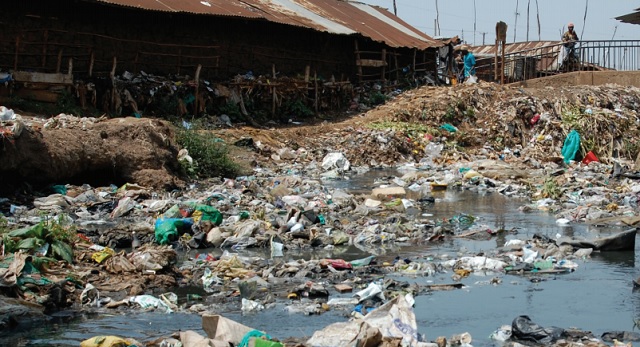
Harnessing data, awareness and investment to tackle Africa’s wastewater woes
Kampala, Uganda | AGENCIES | With an estimated 56 per cent of Africa’s urban population living in slums, wastewater management on the continent is a problem that needs urgent attention.
In the streets of Kibera, one of the world’s largest informal settlements on the outskirts of Nairobi, in Kenya, the water that flowed through the streets was used by locals on a daily basis. Its nasty smell was no deterrent, given that there was no choice… until residents were offered a cleaner option.
Nelly Misango, a young mother who used to cook and wash with the polluted water says her children have fallen sick several times.
“This water had a lot of effect on us. My children would complain of stomach aches, but when I changed the water to the treated one I found a lot of difference.”
Misango is not alone: 700 million people lack basic sanitation, and 300 million lack access to improved drinking water sources, according to the 2017 World Water Development Report.
Wastewater can contain dangerous chemicals, pharmaceuticals, microplastics and pathogens – a hazardous cocktail for the people and animals who consume it, and for the environment.
While wastewater is an obvious health hazard in urban areas, in the countryside its effects are less visible: population growth and increased economic activity are leading to land-based pollution from pesticides, heavy metals, pharmaceuticals and plastic particles, most of which ends up in rivers, lakes or the sea.
Challenges include poor infrastructure, lack of reliable data, poor governance with weak enforcement of legislation and low levels of investment. However, wastewater can be an opportunity, and ecologically and economically beneficial.
For instance, nitrogen, potassium and phosphorus can be recovered for agricultural use as fertilizer and reusing treated wastewater relieves pressure on increasingly scarce clean freshwater sources.
UN Environment, together with the African Development Bank and Norwegian non-governmental organisation GRIDArendal, has started to raise awareness and develop solutions, through a joint project called `The Wastewater Management and Sanitation Provision in Africa: An Opportunity for Private and Public Sector Investment’.
“Wastewater is a very rich soup which can become a health hazard if badly managed, or a source from which humans can generate wealth, if well managed,” says UN Environment wastewater expert Birguy Lamizana.
The three-year project – which runs from November 2016 to the end of 2019 – aims to develop an atlas on wastewater and sanitation provision in Africa.
The atlas will provide information on the current situation and trends, help identify policy and legal gaps, strengthen institutional capacity, and highlight opportunities for private and public sector investment. The project has produced several outreach materials such as policy briefs and a detailed story map that depicts the situation in Kenya.
In October, project partners and interested parties visited the Human Needs Project in Kibera and saw an example of good wastewater management and a school regularly affected by wastewater pollution from Nairobi River.
“Engaging Global Wastewater Initiative members and relevant stakeholders at this stage of the project is very important,” says Lamizana, “as we all advocate for turning wastewater into a valuable resource for the benefit of people and the environment.”
What is UN Environment doing?
Globally, 80 per cent of wastewater ends up in our seas, rivers, lakes, and wetlands; 2.6 billion people do not have access to adequate sanitation; and 2.2 million die of diarrhea each year as a result.
Under the Global Programme of Action for the Protection of the Marine Environment from Land-based Activities, UN Environment is preventing degradation from land-based activities.
The Global Programme also hosts and acts as the secretariat for: The Global Partnership on Nutrient Management, The Global Partnership on Marine Litter, and The Global Wastewater Initiative.
The Global Wastewater Initiative is getting people to move away from waste removal and towards resource recovery.
It focuses on capacity-building and training, promotion of best practices and technologies, awareness raising and communication, and addressing data gaps.
Financing wastewater improvements can be challenging, so UN Environment is in the process of setting up a facility to engage the private sector to upscale business models for wastewater management.
It is also developing scientific knowledge and policy recommendations to support decision-making.
The Wastewater Management and Sanitation Provision in Africa project is supported by the African Development Bank through its Rural Water Supply and Sanitation Initiative (funded by the Governments of Burkina Faso, Canada, Denmark, France, Italy, Switzerland and the Netherlands), and the Multi-Donor Water Partnership Programme (funded by the Governments of Canada and Denmark).
The project is also funded by the Government of Norway and UN Environment, and technically supported by GRID-Arendal.
 The Independent Uganda: You get the Truth we Pay the Price
The Independent Uganda: You get the Truth we Pay the Price





